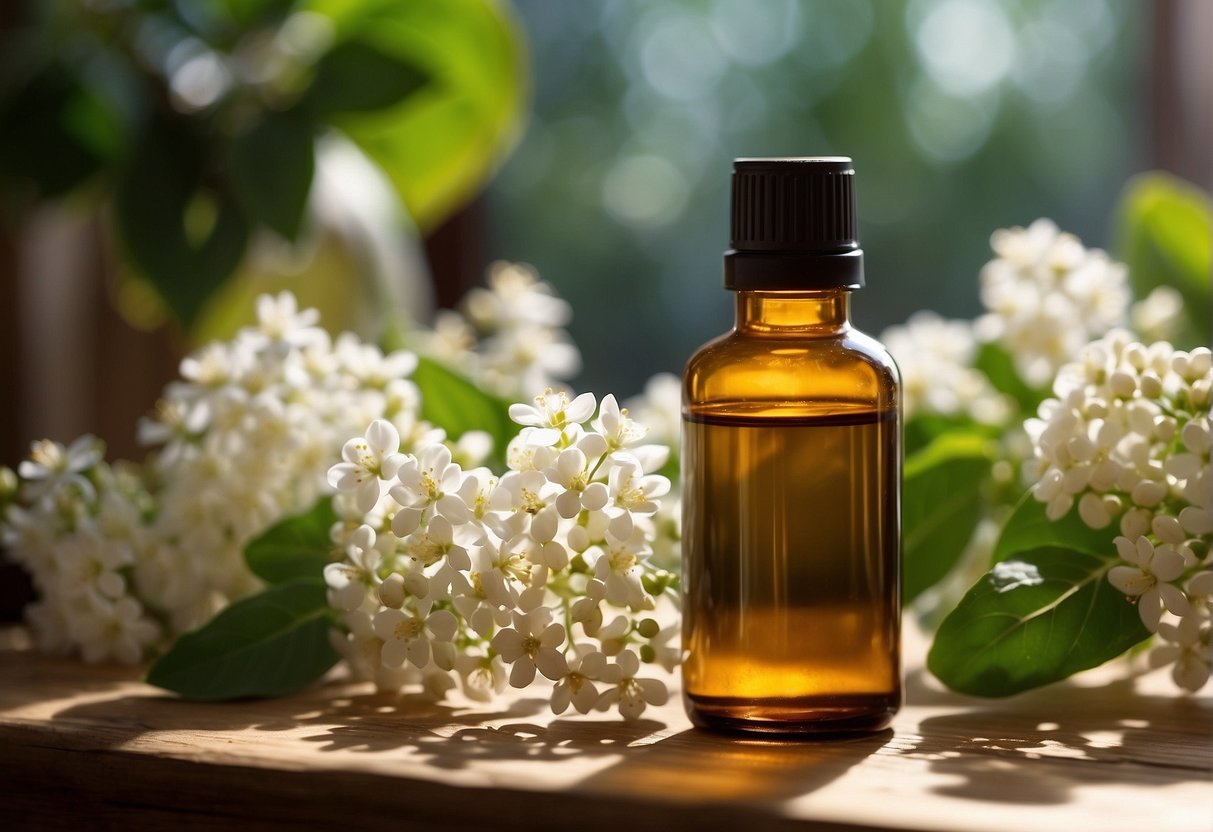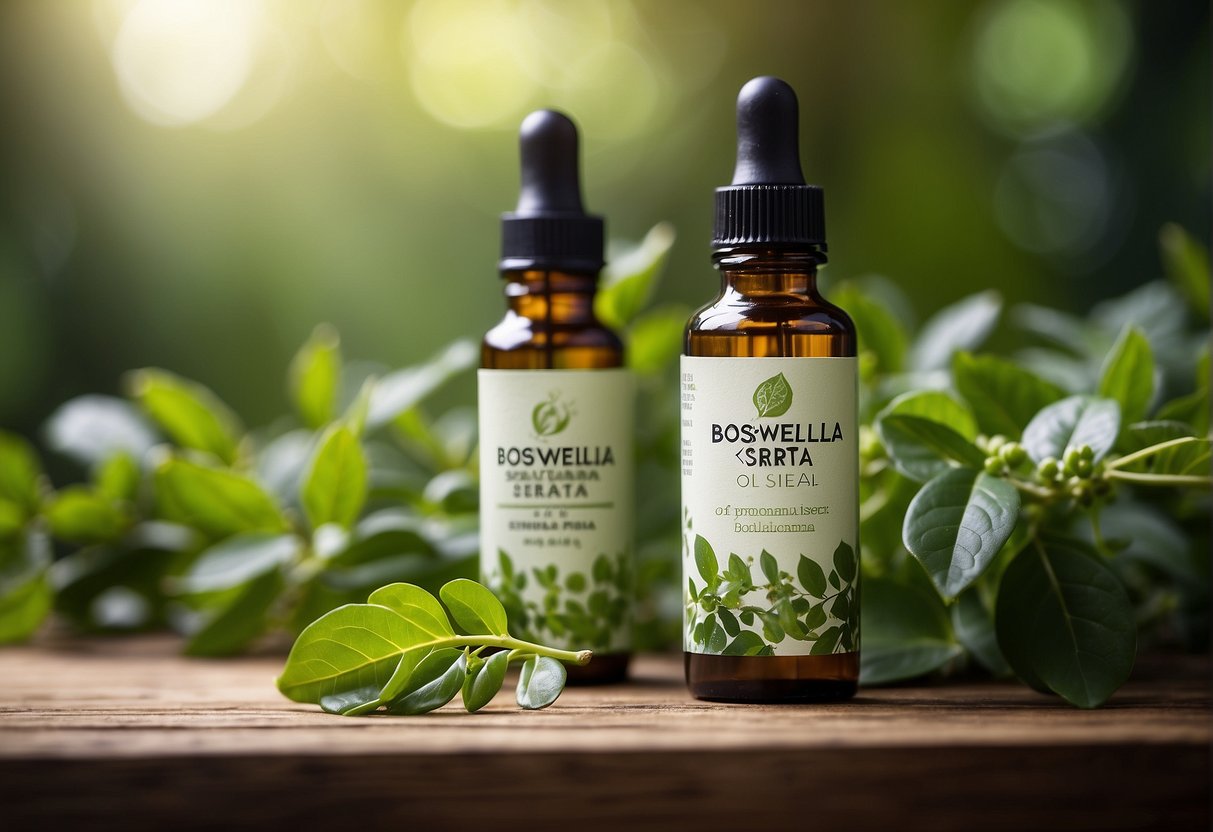Boswellia Serrata Oil Benefits: Exploring the Powerful Effects on Health
Boswellia serrata, commonly known as Indian Frankincense, yields a gum resin rich in essential oils with a broad spectrum of potential health benefits. Used historically in aromatherapy and traditional medicine, its essential oil is derived through steam distillation of the resin. This process preserves the integrity of active compounds such as terpenoids, which are thought to contribute to the oil’s therapeutic properties.

The use of Boswellia serrata oil in aromatherapy taps into its reputed soothing effects that can promote a sense of relaxation and mental clarity. Moreover, scientific interest in the oil has escalated due to its anti-inflammatory and analgesic qualities. These characteristics have positioned it as a candidate for supporting joint health, respiratory function, and an overall sense of well-being.
Key Takeaways
- Boswellia serrata essential oil is used in aromatherapy for its potential to enhance relaxation and clarity.
- Research indicates anti-inflammatory and analgesic properties, suggesting benefits for joint and respiratory health.
- The oil is obtained through steam distillation, ensuring the preservation of its bioactive compounds.
Historical and Cultural Background

We begin by acknowledging that Boswellia serrata, commonly known as Indian frankincense, has a well-documented history intertwined with cultural practices.
Origin and Distribution
Boswellia serrata trees, which produce the resin from which the oil is derived, are native to the dry mountainous regions of India, Northern Africa, and the Middle East. In India, the species is predominant, and the country's diverse ecology supports the optimal growth of these trees. The resin's extraction and subsequent distillation into essential oil have been practiced in these regions for centuries.
Cultural Significance
The use of Boswellia, particularly in the form of incense and oil, holds profound cultural significance. In Ayurveda, an ancient medical practice native to India, Boswellia has been used for its health-promoting properties. Its presence in religious and social rituals spans a history exceeding 5,000 years. The aromatic resin of the Boswellia serrata tree, known as frankincense, has been valued for its fragrant smoke during cultural ceremonies in various parts of the world, including Africa and the Middle East.
Health Benefits and Uses

In exploring the health benefits and uses of Boswellia serrata, we highlight its significant impact on inflammatory conditions and joint health, along with its potential to support respiratory function and skin wellness.
Anti-Inflammatory Effects
Boswellia serrata, known as Indian frankincense, contains active boswellic acids, which exert powerful anti-inflammatory properties. We find these compounds particularly beneficial in the management of chronic inflammatory conditions like rheumatoid arthritis and osteoarthritis.
Pain Relief and Joint Health
Research suggests that extracts of Boswellia serrata can provide pain relief and improve joint function. They are particularly useful in treating symptoms of arthritis, reducing joint inflammation and helping to maintain healthy joint cartilage.
Respiratory Health
Our investigation shows that Boswellia serrata may offer considerable benefits for respiratory health, including the management of asthma symptoms. The extract's anti-inflammatory quality helps in reducing airway inflammation, improving breathing and overall lung function.
Skin Care Benefits
Boswellia serrata extract and the essential oil derived from it, sometimes referred to as frankincense essential oil, are used in skin care for their anti-inflammatory and soothing effects. They can aid in treating inflammatory skin conditions and promote a clearer, more even skin tone.
Scientific Research

In our examination of Boswellia serrata, we focus on its active compounds, particularly boswellic acids, and analyze their effects in various medical studies. The research presented underscores the significant potential of this oil in therapeutic applications.
Studies on Boswellic Acids
Boswellic acids, the key active constituents of Boswellia serrata, have been comprehensively studied for their anti-inflammatory properties. Notably, these compounds inhibit 5-lipoxygenase, an enzyme critical in the formation of leukotrienes which are mediators of inflammation. Research suggests they may augment the immune system's response to inflammation, potentially offering benefits for inflammatory conditions like Crohn’s disease and ulcerative colitis.
Cancer Research
Investigations into Boswellia serrata within oncological settings reveal that boswellic acids exhibit properties that may inhibit tumor growth. Laboratory studies employing cancer cell lines have noted these acids' ability to induce apoptosis (programmed cell death) in tumor cells, while sparing healthy cells. This selective cytotoxicity offers a promising route for adjunct cancer therapies, though further clinical trials are necessary to establish their efficacy in human subjects.
Gastrointestinal Research
The therapeutic potential of Boswellia serrata in the treatment of gastrointestinal disorders has gained interest, especially regarding inflammatory bowel disease (IBD). Multiple studies have considered its effects on chronic conditions like Crohn’s disease and ulcerative colitis. Early clinical trials suggest that boswellic acids can reduce inflammation in the bowel, thereby improving symptoms. Moreover, their safety and efficacy in the brain and overall immune system support make them a potentially valuable option for managing IBD.
Safety and Side Effects
While Boswellia serrata oil is lauded for its health benefits, we must approach its usage with caution, particularly regarding dosage and potential side effects. It's important to know how it might interact with medications and how it affects special populations.

Potential Adverse Effects
Boswellia serrata oil is generally considered safe for consumption, but there are potential side effects that we should be aware of. High dosages can lead to gastrointestinal issues, such as acid reflux, nausea, or diarrhea. Rarely, it may cause allergic reactions in sensitive individuals. Consistent monitoring of the liver function is recommended as there could be a risk of liver toxicity with long-term use.
Interactions with Medications
We recognize that Boswellia serrata oil can interact with medications. Specifically, it may interfere with anti-inflammatory drugs and may amplify the effects of anti-coagulants, posing a risk of increased bleeding. Anyone on long-term medication should consult with a healthcare provider to avoid adverse interactions.
Considerations for Special Populations
For special populations like pregnant women, safety is paramount. There is insufficient research to confirm the safety of Boswellia serrata during pregnancy, so we advise against its use to prevent potential complications. Additionally, due to the lack of robust data on the efficacy and safety in children, we recommend exercising caution and seeking medical advice before administering to minors.
Usage and Administration

We will explore the various forms Boswellia serrata oil is available in, and proper dosage, as well as its potential for combination with other supplements for enhanced benefits.
Forms and Dosage
Boswellia serrata, commonly known as Frankincense, can be administered in several forms, including capsules, tablets, creams, and as an oil. The optimal dosage can vary depending on the form; however, typical daily dosages in capsule or tablet form range from 300 mg to 500 mg, taken three times daily. When using cream formulations, it is applied topically to the affected area, but the concentration of the active ingredient can differ among products, thus following label recommendations is crucial. As for the oil, it is often used in aromatherapy and can be diluted in a carrier oil before applying to the skin.
Combining with Other Supplements
Our understanding of Boswellia serrata oil's benefits is enhanced when considering its combination with other supplements. Commonly, it is combined with turmeric or curcumin, which is the active compound in turmeric, as these two are believed to have synergistic anti-inflammatory effects. As for joint health, glucosamine is another supplement frequently paired with Boswellia for potential additive benefits. Additionally, incorporating a probiotic may aide in a holistic approach to gut health, which can further optimize the effects of Boswellia serrata. It's advisable to consult a healthcare provider before starting any new supplement regimen, especially when combining different products.
Frequently Asked Questions

In this section, we address common inquiries about Boswellia serrata oil and its potential impact on health and wellbeing.
What are the potential health benefits of using Boswellia serrata oil?
Boswellia serrata oil is known for its anti-inflammatory properties, which can aid in managing conditions like osteoarthritis. It also contains boswellic acids that may help reduce pain and improve mobility.
How can Boswellia serrata oil be applied for pain relief?
We can apply Boswellia serrata oil topically to the affected area for pain relief. The oil's anti-inflammatory components can be beneficial for reducing joint and muscular discomfort.
Are there any known side effects associated with the use of Boswellia serrata oil?
While Boswellia serrata oil is generally considered safe, some individuals may experience skin irritation or allergic reactions. It is always recommended to do a patch test before widespread use.
Can Boswellia serrata oil support skin health, and if so, how?
Boswellia serrata oil can support skin health by promoting healing and reducing inflammation. Its use may lead to diminished appearance of scars and fine lines due to its rejuvenating properties.
How does combining Boswellia serrata oil with turmeric enhance its benefits?
When combined with turmeric, Boswellia serrata oil's benefits are enhanced due to turmeric's curcumin content, which also possesses potent anti-inflammatory effects. This combination may provide more comprehensive relief from inflammation.
Is there scientific evidence to support the use of Boswellia serrata oil for reducing inflammation?
There is scientific evidence indicating that the boswellic acids in Boswellia serrata oil can reduce inflammation. These studies suggest that it may be an effective natural remedy for inflammatory conditions.